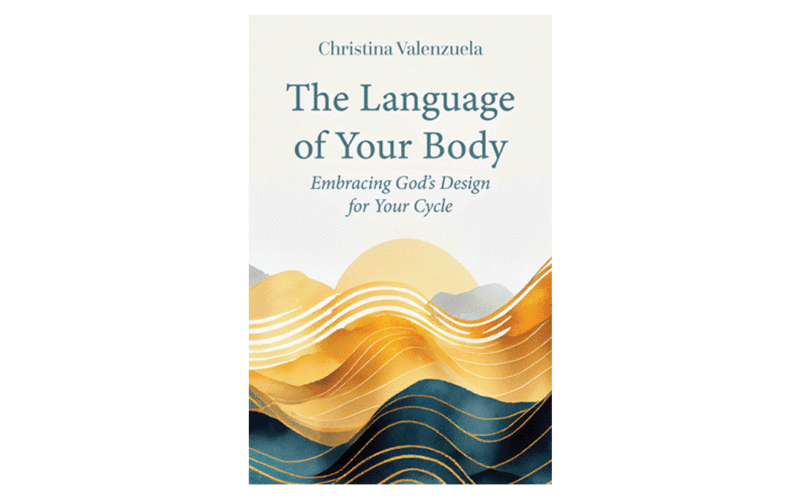"Espero que al invitar a hombres y mujeres a adquirir al menos un conocimiento práctico del ciclo menstrual, podamos crear un terreno fértil en el que crezcan las semillas del aprecio y, en última instancia, del amor" (Valenzuela, 194).
En un mundo que intenta decirnos que nuestros cuerpos no importan, o que no hay diferencias significativas entre hombres y mujeres, y que la respuesta a los trastornos menstruales es desconectar nuestro sistema reproductivo mediante hormonas sintéticas, el nuevo libro de Christina Valenzuela, El lenguaje de tu cuerpo: abraza el diseño de Dios para tu ciclo, proclama lo contrario. En cambio, Valenzuela afirma que las mujeres son intrínsecamente diferentes de los hombres y merecen beneficiarse de fluctuaciones hormonales saludables, que "son necesarias en la articulación de nuestra experiencia femenina encarnada" (Valenzuela, 206). En otras palabras, en El lenguaje de tu cuerpo, Valenzuela analiza el papel integral que desempeñan los ciclos menstruales en el diseño femenino.
Para Valenzuela, la menstruación no es algo que nos ocurra, ni "la maldición de Eva". Por el contrario, son parte integrante de la intrincada interacción hormonal que afecta a la totalidad de la vida de las mujeres. Valenzuela añade un componente adicional desde una perspectiva cristiana católica: nuestros ciclos menstruales afectan a nuestra vida espiritual y forman parte de la imagen única que la mujer tiene de Dios.
Valenzuela es propietaria y directora creativa de Perla y cardoes una fuente de información sobre el ciclo, el cuerpo y la planificación familiar natural (PFN) para todas las edades. Es instructora certificada de Boston Cross Check, un método sintohormonal de PFN que ofrece mayor flexibilidad al combinar biomarcadores de diferentes métodos. Valenzuela también tiene un máster en estudios teológicos por la Harvard Divinity School. Esta formación única le permite comprender la importancia de los ciclos menstruales desde un punto de vista biológico. y perspectiva teológica.
Valenzuela ha compartido anteriormente con Natural Womanhood su Testimonio del PFNEsta experiencia personal le permite hablar a los lectores de todos los orígenes, independientemente de su conocimiento de los ciclos y la cartografía. Esta experiencia personal le permite dirigirse a lectores de todas las procedencias, independientemente de sus conocimientos sobre ciclos y cartografía.
¿Cuál es el público destinatario de ¿El lenguaje de tu cuerpo?
En última instancia, El lenguaje de tu cuerpo está escrito para todo el mundo, pero los lectores con fe judeocristiana, y en particular los cristianos católicos, son los que más probabilidades tienen de coger este libro y beneficiarse de él.
Sin embargo, a lo largo del libro, Valenzuela explica el valor de la cartografía del ciclo para mujeres de todas las edades y vocaciones. Además, demuestra cómo los hombres pueden beneficiarse de la comprensión de los aspectos básicos del ciclo menstrual. Por ejemplo, Valenzuela señala que los hombres casados pueden aprender a amar mejor a sus esposas y a mejorar su capacidad de comunicación, pero no se detiene ahí. Señala que los líderes eclesiásticos pueden mejorar su atención pastoral a las parejas que practican la PFN comprendiendo mejor el papel que desempeña el ciclo menstrual en la vida de las mujeres. El lenguaje de tu cuerpo es especialmente adecuado para las mujeres que desean ir más allá de una visión vergonzosa de sus ciclos para ver cómo un enfoque respetuoso y bien informado puede tener un impacto positivo en su salud y bienestar general, incluida su vida espiritual.
¿Cuáles son las principales áreas de contenido de ¿El lenguaje de tu cuerpo?
El lenguaje de tu cuerpo se divide en 15 capítulos. También incluye un apéndice con recursos para ayudar al lector a elegir un método de PFN. El tema principal del libro es que el ciclo menstrual es un aspecto importante del diseño femenino que puede afectar al bienestar físico, emocional, espiritual y relacional de la mujer.
Los dos primeros capítulos se centran en los aspectos básicos del ciclo menstrual y en por qué las mujeres fieles y las parejas deben preocuparse por los ciclos más allá de planificación familiar. A continuación, aborda las múltiples formas en que el ciclo menstrual forma parte de la imagen que las mujeres tienen de Dios. En los capítulos 9-15 se examinan los aspectos básicos de la cartografía de los ciclos, las diferentes transiciones reproductivas en la vida y cómo la comprensión de nuestros ciclos puede darnos ventajas únicas para crecer en la virtud y mostrarnos a nosotras mismas, a nuestra comunidad y a nuestras relaciones.
Puntos fuertes de El lenguaje de tu cuerpo
Valenzuela tiene un mensaje desafiante que transmitir: nuestros ciclos no sólo son importantes para la salud y la planificación familiar, sino que forman parte de la experiencia femenina tanto corporal como espiritual. Es posible que el lector medio no conozca los componentes sanitarios básicos del ciclo menstrual, por no hablar de conceptos más avanzados como "sincronización de ciclos." Muchas mujeres incluso están de acuerdo con la referencia común a la menstruación como "la maldición de una mujer". Valenzuela conoce a sus lectoras donde están, las guía a través de los conceptos básicos del ciclo menstrual y los gráficos, y les explica por qué la regla es mucho más que "ese momento del mes".
Al igual que Valenzuela, soy instructora de fertilidad y católica devota. Por eso, desde el principio estuve completamente de acuerdo con su mensaje. Sin embargo, creo firmemente que aunque no tuviera conocimientos sobre el ciclo o no entendiera las enseñanzas de la Iglesia Católica sobre estos temas, habría salido de este libro sintiéndome capacitada para trazar, habiendo crecido en mi comprensión de las hormonas y con una nueva capacidad para reconocer la belleza inherente del diseño femenino.
Limitaciones o puntos ciegos
Todo el libro de Valenzuela está bien estructurado, con argumentos sólidos para todos sus puntos. La única limitación que encuentro El lenguaje de tu cuerpo es que está dirigido principalmente a católicos devotos. Para sacar el máximo provecho del libro, Valenzuela da por sentado que sus lectores conocen bien la doctrina católica. Alguien que no sea católico o no entienda la teología católica puede necesitar investigar mientras lee para entender la totalidad de su mensaje.
Valenzuela subraya constantemente que el seguimiento del ciclo puede beneficiar a todas las mujeres y demuestra que es práctico para la mujer normal, al tiempo que reconoce las dificultades y subraya que ninguna mujer debe sentirse presionada para llevar un seguimiento.
Uno de los principales mensajes de Valenzuela es que la conciencia ciclista es una herramienta inestimable para adolescentes. Valenzuela proporciona ejemplos que se pueden relacionar, demostrando el valor que tiene el conocimiento del ciclo en el bienestar físico, emocional y relacional de las mujeres, especialmente en la adolescencia. Además, Valenzuela da razones prácticas de por qué las mujeres solteras adultas pueden beneficiarse de la práctica de los FAM. Las monjas célibes, por nombrar un grupo, obtendrían información inestimable para su salud y para apoyarse mutuamente en la vida comunitaria.
El veredicto: Comprar, tomar prestado o saltárselo El lenguaje de tu cuerpo ¿Todos juntos?
El lenguaje de tu cuerpo recibe mi aprobación. Salí de este libro con un mayor aprecio por la singularidad del ciclo femenino humano y la teología católica sobre el diseño femenino. También aprendí a conocer mejor a las mujeres en las distintas fases reproductivas de la vida y a utilizar mi conocimiento del ciclo para fortalecer mi vida de oración. Desde que lo leí, me he encontrado recomendando este libro a amigos y familiares de todas las edades para ayudarles a comprender el inmenso valor de la cartografía del ciclo. Concedido, El lenguaje de tu cuerpo es católico sin paliativos y beneficiaría principalmente a este grupo religioso. Sin embargo, cualquier lector que desee comprender mejor el cuerpo femenino y cómo afecta a todos los ámbitos de la vida de las mujeres podría sacar provecho de su lectura.







